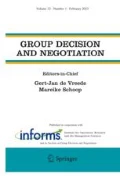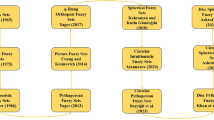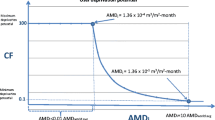Abstract
This paper describes a group decision support system based on an additive multi-attribute utility model for identifying a consensus strategy in group decision-making problems where several decision-makers or groups of decision-makers elicit their own preferences separately. On the one hand, the system provides procedures to quantify the DM’s or group of DMs’ preferences separately. This involves assessing the DM’s or group of DMs’ component utilities that represent their preferences regarding the respective possible attribute values and objective weights that represent the relative importance of the criteria. On the other hand, we propose Monte Carlo simulation techniques for identifying a consensus strategy. An iterative process will be carried out, where, after the simulations have been performed, the imprecise component utilities and weights corresponding to the different DMs or groups of DMs are tightened to output more meaningful information in the next simulations to achieve a consensus strategy. Finally, an application to the evaluation of remedial strategies for restoring contaminated aquatic ecosystems illustrates the usefulness and flexibility of this decision support tool.
Similar content being viewed by others
References
Bratley, P., B. L. Fox, and L. E. Schrage. (1983). A Guide to Simulation. New York: Springer-Verlag.
Bui, T. X. (1987). “Co-oP: A Group Decision Support System for Cooperative Multiple Criteria Group Decision Making”, in Lecture Notes in Computer Science 290. Berlin: Springer-Verlag.
Ethamo, H., M. Verkama, and R. P. Hämäläinen. (1994). Negotiating Efficient Agreements over Continuous Issues. Research Report A51. Systems Analysis Laboratory, Helsinki University of Technology.
Farquhar, P. H. (1984). “Utility Assessment Methods,” Management Science 30, 1283–1300.
Fishburn, P. C. (1964). Decision and Value Theory. New York: Wiley.
Fishburn, P. C. (1970). Utility Theory for Decision Making. New York: Wiley.
French, S. (1986). Decision Theory: An Introduction to the Mathematics of Rationality. Chichester: Ellis Horwood.
French, S., K. N. Papamichail, D. C. Ranyard, and J. Q. Smith. (1997). Design of a Decision Support System for Use in the Event of a Nuclear Accident. RODOS Report (WG5)-TN(97)-04.
Gallego, E., A. Jiménez, A. Mateos, T. Sazykina, S. Ríos-Insua, and M. Windergärd. (2001). “Application of Multiattribute Analysis Methodologies to the Evaluation of the Effectiveness of Remedial Strategies with the MOIRA System”, in L. Monte, J. E. Brittain, L. Häkanson, E. Gallego, M. Zheleznyak, Oleg Voitsekhovitch, I. Krishev, and K. M. Petrov (eds.), Implementing Computerised Methodologies to Evaluate the Effectiveness of Countermeasures for Restoring Radionuclide Contaminated Fresh Water Ecosystems. Rome: ENEA.
Hämäläinen, R. P. (1996). “On-Line Group Decision Support by Preference Programming in Traffic Planning,” Group Decision and Negotiation 5, 485–500.
Holloway, C. A. (1979). Decision Making Under Uncertainty: Models and Choices. New Jersey: Prentice-Hall.
Hull, J. C., P. G. Moore, and H. Thomas. (1973). ‘Utility and Its Measurement’, Journal of the Royal Statistical Society 136, 226–247.
Hwang, C.-L. and M.-J. Lin. (1987). Group Decision Making Under Multiple Criteria. Berlin: Springer-Verlag.
Iz, P. H. and L. R. Gardiner. (1993). “Analysis of Multiple Criteria Decision Support Systems for Cooperative Groups,” Group Decision and Negotiation 2, 61–79.
Jarke, M., M. T. Jelassi, and M. F. Shakun. (1987). “MEDIATOR: Towards a Negotiation Support System,” European Journal of Operational Research 31, 314–334.
Jiménez, A. (2002). Un Sistema de Ayuda a la Decisión Multiatributo con Asignaciones Imprecisas, Ph D. Dissertation. Technical University of Madrid.
Jiménez, A., S. Ríos-Insua, and A. Mateos. (2003). “A Decision Support System for Multiattribute Utility Evaluation Based on Imprecise Assignments,” Decision Support Systems 36(1), 65–79.
Keeney, R. L. and H. Raiffa. (1976). Decision with Multiple Objectives: Preferences and Value-Tradeoffs. New York: Wiley.
Mateos, A., A. Jiménez, and S. Ríos Insua. (2003). ‘A Multiattribute Solving Dominance and Potential Optimality in Imprecise Multi-Attribute Additive Problems’, Reliability Engineering and System Safety 79, 253–262.
Mosteller, F. and P. Nogee. (1951). “An Experimental Measurement of Utility,” Journal of Political Economy 59, 371–404.
Mumpower, J. L. (1991). “The Judgement Policies of Negotiators and the Structure of Negotiation Problems,” Management Science 37, 1304–1324.
Ríos-Insua, D. (1994). “Ambiguity, Imprecision and Sensitivity in Decision Theory,” in J. P. Vilaplana and M. L. Puri (eds.), Recent Advances in Statistics and Probability. VSP.
Schlaifer, R. (1969). Analysis of Decisions Under Uncertainty. New York: McGraw-Hill.
Verkama, M., R. P. Hämäläinen, and H. Ethamo. (1992). “Multi-Agent Interaction Processes: From Oligopoly Theory to Decentralized Artificial Intelligence,” Group Decision and Negotiation 2, 137–159.
Verkama, M., R. P. Hämäläinen, and H. Ethamo. (1994). “Modeling and Computational Analysis of Reactive Behaviour in Organizations,” in K. M. Carley and M. J. Prietula (eds.), Computational Organizational Theory. New Jersey: Hillsdale.
von Nitzsch, R. and M. Weber. (1988). “Utility Function Assessment on a Micro-Computer: An Interactive Procedure,” Annals of Operations Research 16, 149–160.
Author information
Authors and Affiliations
Corresponding author
Rights and permissions
About this article
Cite this article
Jiménez, A., Mateos, A. & Ríos-Insua, S. Monte Carlo Simulation Techniques in a Decision Support System for Group Decision Making. Group Decis Negot 14, 109–130 (2005). https://doi.org/10.1007/s10726-005-2406-9
Issue Date:
DOI: https://doi.org/10.1007/s10726-005-2406-9




